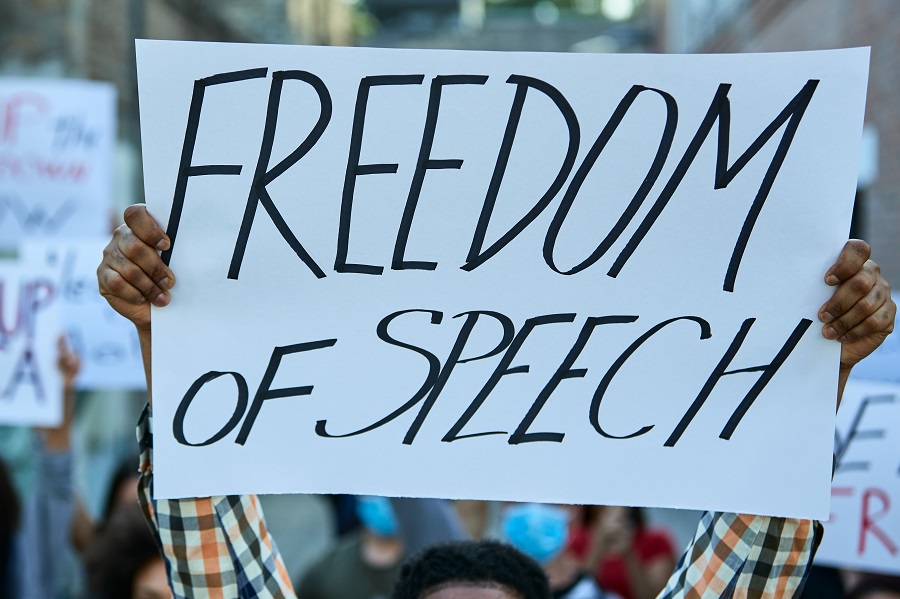Freedom of Speech

Freedom of speech is the cornerstone to democracy. Being able to share ideas without the fear of official retribution is absolutely necessary if society is to improve, as there can be no improvement without criticism of the status quo.
“People demand freedom of speech as a compensation for the freedom of thought which they seldom use.” -Søren Kierkegaard
No Right to Platforms
Freedom of speech does not necessarily give one the right to a mass media platform, especially in the age of the Internet where memes can spread to millions of people in a matter of minutes, potentially misinforming and inflaming those who see it in ways that are dangerous to a stable society.
Free Speech Social Norms
It is easy to conceive of a future where everyone is taught critical thinking and trained to recognize misinformation wherever it appears. In such a society it could be possible for lies, racism and incitement to violence to be shunned to the point that very few are willing to break those taboos. However, this is far from our current reality.
Incitement to violence or chaos is where the line is typically drawn in societies that value free speech. You can't shout "fire" in a theater because it inevitably leads to chaos. You can't threaten others with violence or encourage others to engage in violence. These cases are clear-cut.
More nuance is required when discussing topics like racism, or a big lie that, if true, would justify violence in response.
In these cases it seems that unless tech algorithms serve these lies by the millions to unsuspecting readers, or they are repeated and promoted by political elites, they will stay relegated to small groups of social outcasts like conspiracy theories used to, without the need for official limitations on free speech.
Legal Limits on Free Speech
Free speech is never totally absolute. All societies have some legal limits on speech, particularly defamation or intentionally causing a panic or riot. Many countries also place limits on racism, hate speech, or promoting fascism. Arguments can be made either way with regards to whether this is better. One thing that can be said is that the countries that ban open fascism also happen to be higher on the world happiness scale than the one that is famous for its free speech absolutism, though there are obviously many other factors at work.
You can also make an argument that these ideologies are so cancerous to society, and play so well to our worst instincts, that they cannot be allowed to spread for the inevitably lead to war and genocide. However, this would also be a great argument for creating ritualized anti-fascist social norms to ensure future generations reflexively know never to go there.
If social norms and platform moderation are able to prevent the widespread dissemination of hate speech, then legal limits may not be necessary. This gives people the sense of freedom to know that they could publish a pro-Nazi manifesto if they wanted to, but nobody would have any incentive to do so.
Free Speech, Platforms, and Promotion
Free Speech refers to the legality of speech and the ability for governments to suppress speech. The right to express any thought, no matter how vile, should not be curtailed in a free society.
Platforms (i.e. social media) are private companies and thus any legal "right" to free speech is not enforceable. If their management decides to allow or disallow any kind of speech on those platforms it is their right as a private company; it does not impact any citizen's legal rights because the corporations can't put you in jail (yet).
Promotion refers to the algorithms that Platforms use to recommend content. When an algorithm recommends another piece of content or adds it to a feed, it is effectively promoting that content.
There is a lot of confusion between free speech rights versus platforming rights, which is understandable given that social media has become the place where the vast majority of speech is being generated. It seems logical that in a society with "free speech" you should be able to say anything you want on social media. But legally this is not the case.
Using a metaphor with references old enough for our legislators to understand, let's say there was a newspaper that published a 10,000 page daily issue and offered free classified ads and unlimited space for the letters to the editor section. You would still expect them to exert editorial control and not just publish every single thing that is sent in, just as they do with a normal sized newspaper. Blatant lies, misinformation, slander, etc. would not and should not get published. Nobody complains that their free speech rights are being curtailed when newspapers don't publish their flat earth tirades.
Take it one step further and consider promotion. The way recommendation algorithms on social media currently work effectively gives free advertising to the most harmful content available. While you can ague that there should be a right to "free speech" on major platforms because they effectively serve as a "town square", their is no argument for a right to have that content promoted algorithmically.
Freedom of Music
Music has been a primary place that freedom of speech is expressed and challenged, often in the name of "the children" who enjoy edgy music much more than adults.
Turn on subtitles for this one (unless you speak Russian!)